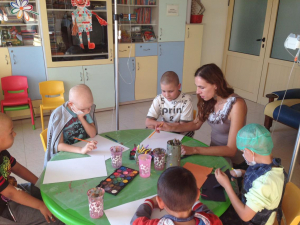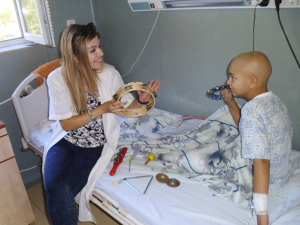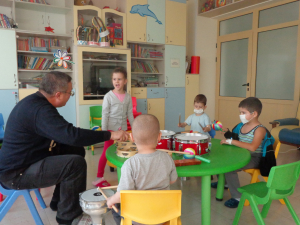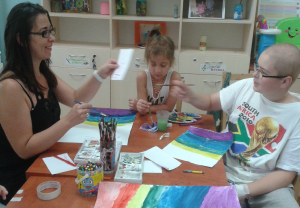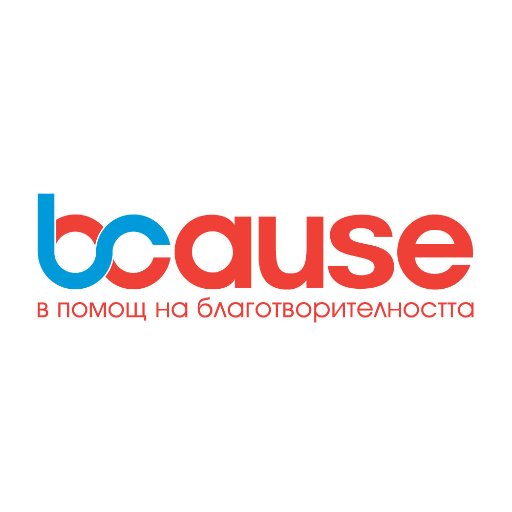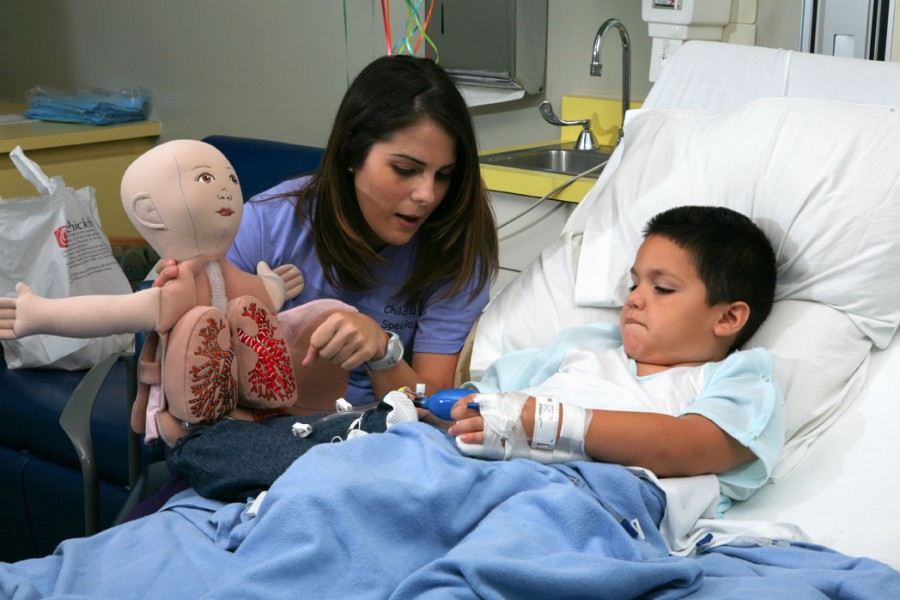
When children and teens are diagnosed with cancer, their whole world changes overnight. Instead of going to school, being with friends, and focusing on the tasks of growing up, they may have to suddenly cope with hospital stays, blood draws, tests, taking medicine, and having surgery or other treatments.
The first few weeks can be frightening and stressful for everyone in the family. Children and teenagers often respond to news of a cancer diagnosis with a range of emotions that reflect those of their parents. The child’s age, stage of development, and personality also affect how they react.
Parents and trusted caregivers know their child in ways that the cancer team does not. The cancer care team has expertise treating cancer in children but you know your child. Your knowledge makes you an important part of the treatment team that will work together to help your child through the first few weeks after diagnosis. This section covers ways to give age-appropriate information about cancer and the reactions children and teens may have, ideas to help create routines and stay connected with life outside of cancer, as well as signs that more help is needed.
Sharing cancer information with your child
It may feel easier to try protect children and teens from cancer by not talking to them about their diagnosis and treatment. Most children and teens figure out something important is happening when they do not feel well, are having tests, and they see adults having quiet conversations with health care professionals. Most children and teens will be less worried and afraid if they are given honest and age-appropriate information about their cancer from the beginning. Having information also helps them cope and builds trust in their caregivers.
Children understand what is happening in different ways, depending on their age and other developmental factors. Talk with the cancer care team about resources to help you talk with your child about their diagnosis. Some families prefer to have adults receive the information first and then share it with the child. Other families find that it works best if everyone hears information from the cancer care team together. You can ask the cancer care team to talk to your child with you present or you may choose to be the one to share the information with your child and a few trusted friends or family members. Here are some general principles for talking with children about their cancer based on their age group.
Infants and very young children (0 to 2 years)
- Feel more secure when the routines that they have at home are continued.
- Are comforted by being close to, cuddled, and cared for by their parents and trusted caregivers.
- May be fearful of strangers and cry when the cancer care team comes in the room, making it hard to talk with the team.
Toddlers and Preschoolers (2 years to 5 years)
- Should know the name of their cancer, simple facts about treatments, and hear basic information about how day-to-day life will change.
- Might like to learn what is happening through medical play with special dolls or activities designed to teach children about their treatment.
- Need to know that nothing they said, thought, or did caused this.
- Need to know it isn't something they can get from other people, pets, or the world around them.
School-age children with cancer (6 years to 12 years)
- Might have their own ideas about what cancer is, so it can be helpful to ask them what they know about cancer early on.
- Should be told the name of their cancer and how it will be treated.
- Will need information about what happens with school and other activities during treatment.
- Need to hear that they are not being punished for something they did wrong.
- May have questions and concerns about changes in appearance.
- Might ask if they are going to die. See What If Your Child Asks If They Are Going to Die?
- Find it helpful to read books about or talk with other children their age who have cancer (some hospitals have computer systems with information and digital games geared toward teaching children with cancer).
- Need to know that you will always try to tell them the truth and that it is good for them to ask questions or share feelings when they are sad, worried, or afraid.
Teenagers (12-18 years)
- Will usually be able to understand more complex information about their cancer, including treatment, procedures, and risks and benefits.
- Should hear diagnosis and treatment information directly from the health care team, as much as possible.
- Might find it helpful to connect with people their age who have cancer.
- Might have concerns about changes in appearance, including changes in weight and hair loss.
- Might ask if they are going to die. See What If Your Child Asks If They Are Going to Die?
- Usually want to know if they can still do things "normal" teens do such as parties, school activities, and hanging out with friends.
- Might have a good understanding of what cancer is in adults and need more information about what is different in children and teens.
- Should be offered the chance to participate in decisions about treatment and hear what is being recommended.
- Might benefit from talking with social workers and psychologists at the hospital or cancer clinic to talk about feelings without their primary caregivers being present.
Understanding how children and teens react to a cancer diagnosis
Children and teens react in many different ways to having cancer and starting treatment. There are some general things you may see in different ages that are all part of the normal process of adjusting to a serious illness. It is normal to experience stress after diagnosis but even normal reactions can be hard to manage without some help and advice from people who specialize in helping children with cancer adjust. Talk to the cancer care team about working with a psychologist or social worker. These specialists are often present in pediatric cancer centers and will meet with you and your family and help with any coping problems.
Infants and very young children with cancer might
- Fear being separated from parents
- Be afraid of and upset by painful medical procedures
- Withdraw, avoid interacting with others
- Cling to parents
- Not do things like walking, talking, or self-feeding on schedule for their age
- Need only a small number of cancer care team members to care for them to help with stranger anxiety
Toddlers and pre-schoolers with cancer might
- Yell, scream, throw tantrums, hit, or bite
- Regress to behaviors such as thumb sucking or bed wetting
- Be afraid of and upset by painful medical procedures
- Do well with consistent routines for medical procedures, such as blood draws, taking medicine, going to the hospital or clinic
- Might enjoy getting a sticker on a sticker chart for each activity
- Ask a lot of questions
School-age children with cancer might
- Be upset by disruption of school
- Miss seeing classmates and friends
- Show anger and sadness over the loss of health, school, and normal life
- Worry that they caused the cancer
- Worry that cancer is “catching”
- Look for more emotional and social support from family and friends
Teens with cancer might
- Be upset by the disruption of school and their activities with friends
- Be upset about changes in their appearance
- Feel their independence is threatened
- Show intense emotional responses
- Focus on the meaning of life and the cancer’s effect on their identity
- Take risks that could cause problems
- Rebel against parents, doctors, and treatments
Finding a new normal
Children and teens will cope better if they see their loved ones managing stress and coping well.There are some important things you can do to help your child and teen adjust in the first few weeks. Here are some general strategies to help them adjust during the first few weeks after diagnosis and beyond:
- Ask for support with resources on the team that focus on helping with coping early on, such as Child Life Specialists, Psychologists, and Social Workers.
- Think about your parenting style and try not to change your expectations for their behavior because of cancer, it helps your child to keep things the same.
- Encourage your child or teen to talk about their feelings with you, another trusted caregiver, or member of the healthcare team.
- Encourage play time and activities to distract from painful procedures or during long hospital stays and clinic visits.
- Talk with your cancer team about ways to manage side effects of treatment, so your child feels as good as possible during treatment.
- Ask your cancer care team when your child can return to school and other activities. Even if they cannot participate, they may be able to watch activity practice or attend school part-time.
- Keep your school-aged child or teen connected with their friends.
- Ask about visits during hospital stays or clinic visits from different kinds of support therapists, many hospitals have pet therapy, music therapy and art therapy.
- Ask about school services during hospital stays and clinic visits, some hospitals have teachers on staff who can help with school work when your child is well enough.
- Look for camp programs or support groups for older children and teens with cancer, your cancer care team can provide information on what is available.
- Give your child choices, when appropriate. Toddlers and preschoolers can decide which color medicine to take first. Older children can often help write down medicines that work best for managing side effects like nausea or pain.
Knowing when a child needs extra help adjusting
After the first few weeks, many families find managing cancer starts to get a little easier. The worries and challenges cancer brings may not go away, but families often have learned more about what to expect and may feel that day-to-day life is more predictable. For some children and teens it can take a little longer.
Over time, with support most children with cancer are able to cope, but there are times when it might get to be too much. If a child seems to be having a lot of trouble, even after the first few weeks of treatment, they might benefit from some extra help adjusting. Extra help is needed if a child:
- Is unable to handle the feelings of sadness
- Feels sad all the time
- Can't be comforted
- Admits to thinking of suicide or hurting himself or others
- Feels extra irritable
- Becomes very angry very quickly
- Refuses to take important medicines at home or in the hospital
- Refuses treatments
- Refuses to come to the clinic or the hospital
- Withdraws or goes into isolation
- Cries a lot
- Has trouble sleeping
These are signs that should be discussed with the child’s doctor right away. You can talk with a psychologist or social worker at the cancer center who can evaluate the child and make sure that they get the kind of help they need. Rarely, a child may need to see a psychiatrist for medicine or counseling.
